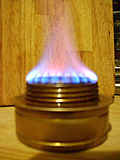Alcohol burner
Alcohol Burner[edit]
An alcohol burner or spirit lamp is a piece of laboratory equipment used to produce an open flame. It can be made from glass, brass, or aluminum. Alcohol burners are commonly used in laboratories and classrooms for heating, sterilization, and combustion.
Design and Function[edit]
Alcohol burners consist of a small reservoir to hold the alcohol fuel, a wick that draws the alcohol up to the flame, and a cap to extinguish the flame and prevent evaporation when not in use. The burner is typically filled with denatured alcohol, ethanol, or methanol.
Materials[edit]
- Glass Alcohol Burners: These are often used in educational settings due to their transparency, which allows users to see the fuel level.
- Metal Alcohol Burners: Made from materials such as aluminum or brass, these are more durable and often used in more demanding laboratory environments.
Operation[edit]
To operate an alcohol burner, the user fills the reservoir with alcohol, inserts the wick, and lights the wick with a match or lighter. The flame can be adjusted by changing the length of the exposed wick. To extinguish the flame, the cap is placed over the wick to cut off the oxygen supply.
Applications[edit]
Alcohol burners are used in various applications, including:
- Laboratory experiments requiring a small, controlled flame.
- Cooking in portable stoves, such as the Trangia system.
- Sterilization of equipment in microbiology and medical settings.
Advantages and Disadvantages[edit]
Advantages[edit]
- Simple and easy to use.
- Portable and lightweight.
- Produces a clean flame with minimal soot.
Disadvantages[edit]
- Limited heat output compared to other burners like Bunsen burners.
- Requires careful handling to prevent spills and evaporation.
Safety Considerations[edit]
When using an alcohol burner, it is important to:
- Use in a well-ventilated area to avoid inhaling fumes.
- Keep flammable materials away from the flame.
- Ensure the burner is stable and cannot be easily knocked over.
- Allow the burner to cool before refilling.
Related Pages[edit]
Gallery[edit]
-
Aluminum alcohol burner
-
Alcohol burner in use
-
Trangia spirit burner
-
Trangia burner
-
Capping an alcohol burner
-
Glass alcohol burner
-
Aluminum alcohol burner
-
Alcohol burner
-
Trangia Spirit Burner
-
Trangia burner
-
Capping
-
Glass alcohol burner
Ad. Transform your life with W8MD's Budget GLP-1 injections from $49.99


W8MD offers a medical weight loss program to lose weight in Philadelphia. Our physician-supervised medical weight loss provides:
- Weight loss injections in NYC (generic and brand names):
- Zepbound / Mounjaro, Wegovy / Ozempic, Saxenda
- Most insurances accepted or discounted self-pay rates. We will obtain insurance prior authorizations if needed.
- Generic GLP1 weight loss injections from $49.99 for the starting dose of Semaglutide and $65.00 for Tirzepatide.
- Also offer prescription weight loss medications including Phentermine, Qsymia, Diethylpropion, Contrave etc.
NYC weight loss doctor appointmentsNYC weight loss doctor appointments
Start your NYC weight loss journey today at our NYC medical weight loss and Philadelphia medical weight loss clinics.
- Call 718-946-5500 to lose weight in NYC or for medical weight loss in Philadelphia 215-676-2334.
- Tags:NYC medical weight loss, Philadelphia lose weight Zepbound NYC, Budget GLP1 weight loss injections, Wegovy Philadelphia, Wegovy NYC, Philadelphia medical weight loss, Brookly weight loss and Wegovy NYC
|
WikiMD's Wellness Encyclopedia |
| Let Food Be Thy Medicine Medicine Thy Food - Hippocrates |
Medical Disclaimer: WikiMD is not a substitute for professional medical advice. The information on WikiMD is provided as an information resource only, may be incorrect, outdated or misleading, and is not to be used or relied on for any diagnostic or treatment purposes. Please consult your health care provider before making any healthcare decisions or for guidance about a specific medical condition. WikiMD expressly disclaims responsibility, and shall have no liability, for any damages, loss, injury, or liability whatsoever suffered as a result of your reliance on the information contained in this site. By visiting this site you agree to the foregoing terms and conditions, which may from time to time be changed or supplemented by WikiMD. If you do not agree to the foregoing terms and conditions, you should not enter or use this site. See full disclaimer.
Credits:Most images are courtesy of Wikimedia commons, and templates, categories Wikipedia, licensed under CC BY SA or similar.
Translate this page: - East Asian
中文,
日本,
한국어,
South Asian
हिन्दी,
தமிழ்,
తెలుగు,
Urdu,
ಕನ್ನಡ,
Southeast Asian
Indonesian,
Vietnamese,
Thai,
မြန်မာဘာသာ,
বাংলা
European
español,
Deutsch,
français,
Greek,
português do Brasil,
polski,
română,
русский,
Nederlands,
norsk,
svenska,
suomi,
Italian
Middle Eastern & African
عربى,
Turkish,
Persian,
Hebrew,
Afrikaans,
isiZulu,
Kiswahili,
Other
Bulgarian,
Hungarian,
Czech,
Swedish,
മലയാളം,
मराठी,
ਪੰਜਾਬੀ,
ગુજરાતી,
Portuguese,
Ukrainian




